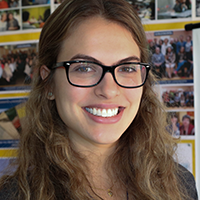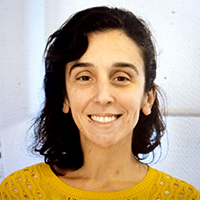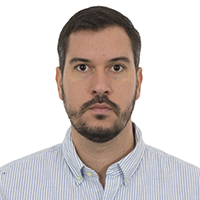 Ursula Mello | Chair and presenter
Ursula Mello | Chair and presenter
Affirmative action and demand for schooling: Evidence from nationwide policies
Ursula Mello is an applied economist interested in Education, Labor and Public Policy. In her research, she uses applied microeconometrics methods to investigate key issues for Educational and Labor Market policies. In the area of Education, her recent work is concentrated on the impact of large reforms in the admission process to higher education. In particular, she studies how the centralization of admissions and the expansion of affirmative action quotas, in the context of Brazil, affected the composition of the student body, individuals' incentives, and choices. In the topic of Labor, her work is focused on intergenerational mobility and labor market adjustments to economic shocks.
 Noemi Katzkowicz | Presenter
Noemi Katzkowicz | Presenter
Spatial inequalities in educational opportunities: The role of public policies
Noemi Katzkowicz is Research Assistant at the Economics Institute of the Faculty of Economic Sciences and Administration and is a doctoral candidate at the Hebrew University of Jerusalem. She finished her Master's Degree in Economics at the National University of La Plata in Argentina, where she conducted an evaluation of the effect of "Assistance Goals" on the rates of prenatal check-ups and health outcomes of newborns. During her career, she worked at the Ministry of Public Health (Health Economics Division), at the University of the Republic in Uruguay, and as a research collaborator at CEDLAS. She carried out various consultancies for FLACSO (Chile), MERCOSUR, Ministry of Social Development (Uruguay), Ciedur, Unesco, IDRC, among others.
 Rodrigo Oliveira | Presenter
Rodrigo Oliveira | Presenter
The impacts of studying abroad during university: Evidence from a Brazilian massive scholarship program
Rodrigo Oliveira is a Research Associate at UNU-WIDER, and my research interests are Development Economics and Public Policies, focusing on Education, Labor Market, Poverty, and Inequality. His leading research focuses on the impact of education on a wide range of outcomes and uses different econometric methods. During my Ph.D., he studied how education and labor market structure explain the evolution of Brazil's regional inequality between 1970 and 2010. After the Ph.D., his research has focused on the impact of vocational training and affirmative action policies. Recently he started projects involving tax-and-benefit microsimulation methods in selected African countries and the long-term impacts of socio-economic shocks. He has five years of experience leading research teams in Brazilian Universities. One year of experience leading a research team in the Brazilian private sector. Besides, he has experience as a visiting researcher at CIDACS-Fiocruz and Clear-FGV. Currently, he coordinates research and technical assistance activities in Mozambique and Tanzania in collaboration with UNU-WIDER colleagues.
 Join the network
Join the network Ursula Mello | Chair and presenter
Ursula Mello | Chair and presenter Noemi Katzkowicz | Presenter
Noemi Katzkowicz | Presenter Rodrigo Oliveira | Presenter
Rodrigo Oliveira | Presenter